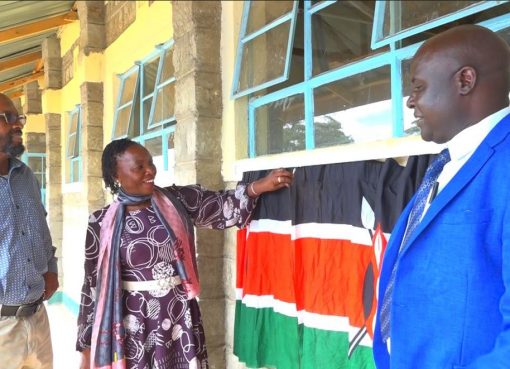Pan-African Public Relations (PR) firm Glass House PR has launched a Report on the state of public relations in Africa.
The report engaged 28 public relations agencies from at least fifteen (15) countries across the continent, representing North, South, East, and West Africa, along with insights from industry thought leaders and the general public.
The report further provides a comprehensive, data-driven perspective on the trends, challenges, and opportunities shaping public relations in Africa today.
These insights serve as a valuable resource for professionals across various sectors, including government, technology, healthcare, finance, nonprofit organizations, development, media, event management, hospitality, and retail.
Additionally, the Report is viewed as an indispensable resource for industry leaders, policymakers, and communication strategists looking to navigate the future of PR in Africa.
Speaking at the launch, Glass House PR Chief Executive Officer (CEO) Mary Njoki noted that the PR industry in Africa is at a pivotal moment, with digital disruption, demographic shifts, and increasing demand for strategic communication reshaping how the industry engages with audiences.
“This report is a roadmap for PR professionals, businesses, and policymakers to navigate these changes and harness the power of storytelling for impactful communication,” she added.
Meanwhile, key findings from the report underscore the evolving challenges and opportunities within the industry including the Perception and Value of PR where the perception and understanding of PR’s value remains the most significant challenge, with 22.22 percent of respondents identifying it as the primary hurdle.
Additionally, economic instability and high client expectations with limited budgets impact 12.35 percent of respondents each, while budget constraints remain a recurring issue for 11.11 percent of professionals in the industry.
Another finding is the storytelling and cultural sensitivity where storytelling remains central to PR strategies, with 41.38 percent of respondents ranking it as extremely important, particularly in aligning narratives with African values and development goals. Moreover, cultural sensitivity plays a critical role in campaign effectiveness, with 62.96 percent of respondents emphasizing its high impact on success.
On AI Integration in PR finds that while 46.43 percent of PR firms have already integrated AI tools into their daily processes, AI adoption remains in its early stages across the industry. Nearly 63 percent of media houses report limited or no AI integration, highlighting a significant opportunity for technological advancement.
The primary PR Objectives finds that building brand awareness and market presence remains the top objective of PR efforts in Africa, with 37.70 percent of respondents citing it as their main focus. The ability to measure brand awareness within specific communities is the most requested PR success metric (25.00%), reflecting a shift towards targeted, measurable communication strategies.
The findings on technology and crisis management reveals that the adoption of technology in crisis communication is on the rise, with 50.00 percent of PR professionals focusing primarily on technological solutions for crisis management, while 46.43 percent maintain a moderate focus. In addition, mobile-first platforms (24.19%) and Artificial Intelligence (AI)-driven targeted communication (22.58%) are recognized as the most critical technologies for PR growth.
According to the report, data analysis and measurement findings show that measuring PR success is increasingly driven by data, with 22.67 percent of professionals identifying data analysis and measurement as the most crucial skills in the industry. Additionally, 18.67 percent of respondents highlight the importance of innovation in storytelling, emphasizing the growing need for creative, data-driven approaches.
On growth areas in PR, digital-first campaigns lead as the fastest-growing area in PR across Africa, with an expected growth rate of 10.83 percent. Corporate reputation management follows at 10.00 percent, and marketing communications at 9.17 percent, reinforcing the increasing importance of digital strategies in the industry.
Other findings include talent retention and recruitment where the industry faces significant challenges in hiring and retaining talent, with 35.48 percent of respondents identifying talent retention as the most pressing issue.
Further, hiring mid-level staff (14.52%) and recruiting professionals from diverse career backgrounds (11.29%) are also key concerns. Notably, 33.93 percent of new hires in PR come from advertising and marketing industries, while journalism (21.43%) and rival PR agencies (16.07%) also serve as talent pipelines.
At the same time, the report also provides key insights in the build-up to the Africa Global PR Week Scheduled for August 27th to 29th, 2025, in Nairobi, that aims to foster collaboration, upskill PR professionals and promote best practices across Africa.
In her remarks, Zambian PR professional Stacey Baluske Mtika implored that the PR industry in Africa is undergoing a dynamic transformation, and platforms like Africa Global PR Week provide an opportunity for practitioners to exchange ideas, embrace innovation, and shape the future of communication on the continent.
“In Africa, PR is ever-evolving, and collaboration is key to staying ahead,” she emphasized.
The Glass House PR report provides game-changing insights for PR professionals, businesses and policymakers to navigate the evolving landscape. As digital strategies, AI integration and cultural sensitivity become increasingly vital, the industry must adapt to leverage these opportunities for greater impact.
By Michael Omondi





